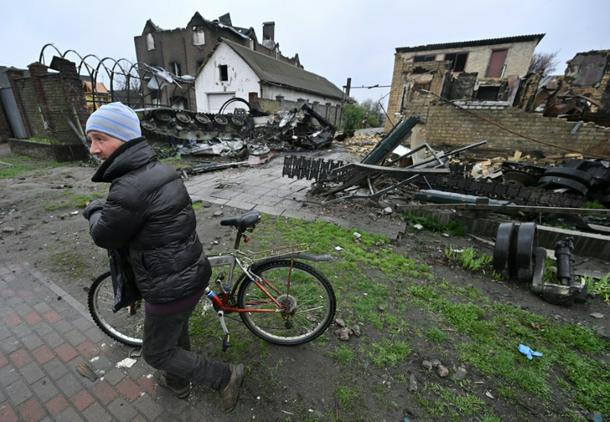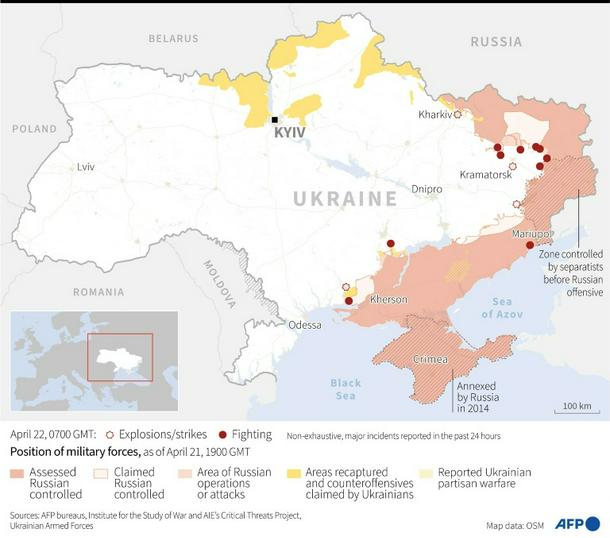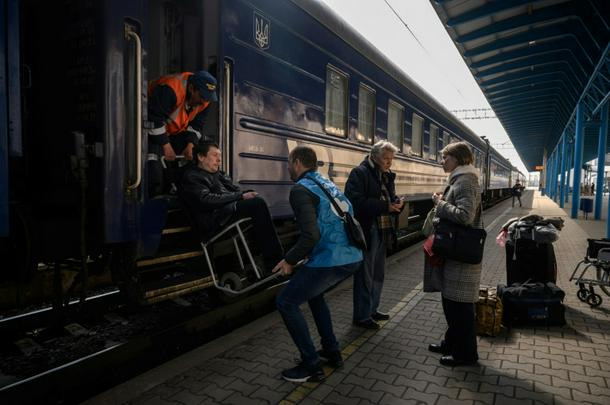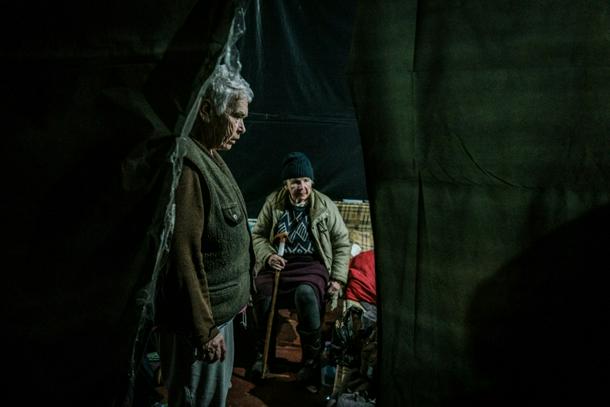
A man pushes his bicycle past a destroyed Russian armoured personnel carrier in the village of Gostomel, close to Kyiv on April 22, 2022
Zaporizhzhia (Ukraine) (AFP) - Ukraine said it would make a fresh attempt on Saturday to evacuate civilians from Mariupol, the devastated port city largely controlled by Russian forces, as hopes for a weekend truce during Orthodox Easter faded.
The war enters its third month on Sunday with civilians continuing to pay a heavy price amid the ongoing fighting.
“Today we will again try to evacuate women, children and the elderly,” Deputy Prime Minister Iryna Vereshchuk said on Telegram.
“If everything happens as planned, we will start the evacuation around noon.”
The call came a day after a senior Russian military officer said “the second phase of the special operation” – as Moscow terms its invasion of Ukraine – had begun, with the aim of controlling a huge, strategic part of Ukrainian territory.
“One of the tasks of the Russian army is to establish full control over the Donbas and southern Ukraine,” Major General Rustam Minnekaev said on Friday.
Russian forces, which withdrew from around Kyiv and the north of Ukraine after being frustrated in their attempts to take over the capital, already occupy much of the eastern Donbas region and the south.
Minnekaev said their focus was now to “provide a land corridor to Crimea,” which Russia annexed in 2014, and towards a breakaway pro-Russian region of Moldova, Transnistria, where the general claimed Russian-speaking people were “being oppressed”.

Graphic showing position of military forces and main strikes and areas of fighting in Ukraine as of April 22, 0700 GMT
Ukrainian authorities have vowed to fight on and drive the Russian troops from their land, but they also sought an Easter pause.
“Unfortunately, Russia rejected the proposal to establish an Easter truce,” said President Volodymyr Zelensky earlier this week.
In his regular Friday night address, Zelensky said the Russian general’s comments were a clear articulation of Moscow’s goals.
“This only confirms what I have already said multiple times: Russia’s invasion of Ukraine was intended only as a beginning,” he said.
Ukraine’s government, emboldened by an influx of Western weaponry, said its beleaguered forces were still holding out inside a sprawling steelworks in the razed port city of Mariupol.
The Kremlin has claimed the “liberation” of Mariupol, which is pivotal to its war plans nearly two months after President Vladimir Putin ordered the shock invasion of Russia’s Western-leaning neighbour.
- Humanitarian appeal -
In a phone call to Putin, EU chief Charles Michel appealed for humanitarian access to Mariupol, which has been largely destroyed by weeks of intense Russian bombardment.
“Strongly urged for immediate humanitarian access and safe passage from Mariupol and other besieged cities all the more on the occasion of Orthodox Easter,” Michel tweeted.

Internally displaced people board an evacuation train the day after arriving as part of a humanitarian convoy from the besieged city of Mariupol, at a railway station in the southern city of Zaporizhzhia on April 22, 2022
Putin however accused Kyiv of refusing to allow its troops to surrender in Mariupol.
“All servicemen of the Ukrainian armed forces, militants of the national battalions and foreign mercenaries who laid down their arms are guaranteed life,” Putin told Michel, the Kremlin said.
Ukraine says hundreds of its forces and civilians are holed up inside the sprawling Azovstal steel plant in Mariupol, and Kyiv has repeatedly called for a ceasefire to allow women, children and the elderly to safely exit the shattered city.
Russia’s defence ministry earlier said it was ready to observe a humanitarian pause if Kyiv’s troops surrendered.
“The enemy’s offensive operation in the south hinges on Mariupol. The enemy is trying to focus all its efforts on it,” Pavlo Kyrylenko, governor of the eastern region of Donetsk, told AFP.
Near the frontlines in eastern Ukraine, a smattering of residents still held out amid frequent bouts of shelling.
After two months of sustained Russian artillery fire, the hamlet of Lysychansk, located just 14 kilometres (nine miles) from Russian ground forces, has largely turned into a ghost town.
Only a small sheltered market in the centre of town is still operating, providing food and other supplies after the town’s other market was bombed.
“Everyone, this is going to end badly,” said an elderly woman in line for vegetables, fearing a targeted strike by Russian forces similar to a deadly train station rocket attack in the nearby town of Kramatorsk on April 8 that killed at least 52 people.

Near the frontlines in eastern Ukraine, a smattering of residents still held out amid frequent bouts of shelling
In Severodonetsk, just 10 kilometers (six miles) from Russian positions, the city’s volunteers and medical personnel continue to hold the fort in a local hospital that is littered with broken windows and some floors are plunged into darkness.
Shelling resumed recently, and the city is likely to soon be surrounded by advancing Russian troops.
“We will stay here until the last patient,” says Roman Vodianik, the hospital’s chief, whose office is decorated with Orthodox Christian icons.
- Summary executions -
Russia’s change of strategic focus to southern and eastern Ukraine saw invading forces leave behind a trail of indiscriminate destruction and civilian bodies around Kyiv, including in the commuter town of Bucha.
A United Nations mission to Bucha documented “the unlawful killing, including by summary execution, of some 50 civilians there”, the UN’s Office of the High Commissioner for Human Rights said.
Its spokesperson Ravina Shamdasani said Russian forces had “indiscriminately shelled and bombed populated areas, killing civilians and wrecking hospitals, schools and other civilian infrastructure, actions that may amount to war crimes”.
Ukrainian officials say the bodies of more than 1,000 civilians have been retrieved from areas around Kyiv.
burs-ds/yad